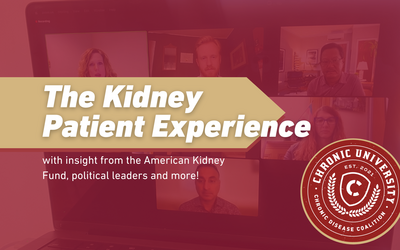
Millions of Americans have kidney disease and don’t know it. While it isn’t always obvious in the early stages, the disease takes its toll in the long run.
Although that can sound scary, there’s a lot of good news, as Chronic University, “The Kidney Patient Experience” panelists discussed on March 24. Kidney disease prevention and early detection is imperative for individuals, and improved healthcare policy helps support all 37 million Americans with kidney disease.
Take your Health into Your Own Hands
One of the best actions you can take to prevent kidney disease is to live a healthy lifestyle. Basic steps like eating well, exercising and drinking lots of water all contribute to a longer, healthier life. If you do get diagnosed with kidney disease, maintaining that healthy lifestyle can help manage your disease so you can delay more intensive treatments such as dialysis. CDC Ambassador Elizabeth Oldham shared that she donates healthy food to dialysis centers to ensure that patients have access to proper nutrition, no matter their financial circumstance. If you need resources on what kidney-friendly meals you should make, see the American Kidney Fund’s kidney-friendly eating plan.
Panelist, Deborah Darcy, senior director of government relations at the American Kidney Fund (AKF) also discussed other ways that the AKF supports kidney patients, including direct financial assistance grants.
The Benefits of Early Detection
The best ways to avoid intense treatments such as dialysis and kidney transplants is through early detection and managing the condition early on. In Colorado, Representative Brianna Titone says that they “want to ensure we help the people of Colorado not get to a serious situation where they need to be on dialysis or get a transplant because those are expensive.”
Rep. Titone was a cosponsor of a bill that passed during the 2021 Legislature that established a chronic kidney disease task force to study the disease’s impacts on Coloradans and formally recommend an educational awareness program to the Legislature down the road. Bills like these, with champions like Rep. Titone (herself a kidney patient), are critical to elevating the voice of those with lived experience in decisions that directly impact them.
To help achieve this, Colorado works with university hospitals to get experts to put together ways that they can educate the people of Colorado about kidney disease and eliminate the high costs of living with dialysis or a transplant. “We are trying to be proactive, ensure people in Colorado know what to look out for.”
Be Your Own Advocate
Both with your doctor and with your elected leaders, advocating for your health is imperative with any chronic illness. CDC Ambassador Elizabeth Oldham describes kidney disease as a “silent killer,” and notes that it’s essential to ask your physicians lots of questions and to be diligent in understanding your test results. Taking a deep dive into your own health care can help to detect signs of kidney disease early.
Former Fire Chief Gil Dong managed lupus’ effects on his kidneys for years with diet and exercise. But when the disease intensified and required him to do at-home dialysis, he went in search of a kidney donor. That was four years ago, and today, both he and his friend and living donor Peter Yung are living full and energetic lives. (add blog link)
The CDC and partner organizations work to make living donor kidney donations easier by ensuring insurance and job protections and providing grants for non-medical costs. A current example, a precedent-setting bill (AB 2504) sponsored by California Assemblymember Ash Kalra would reimburse living organ donors up to $10,000 for costs not covered by insurance. Asm. Kalra says, “we need people to lend their voices” in order to create support for bills that enact change. “What makes it to the governor’s desk are the voices that come from outside of the capitol building.”
You can share your story on the CDC’s submission form and we’ll help your story get in front of the right leaders.
Did you miss this session? You can view the whole recoding HERE and see helpful resources that our speakers shared:
- Learn about the benefits of Medigap expansion
- Dialysis Patient Citizens
- Health Insurance Premium Program
- Get assistance from American Kidney Fund
- Register to be a Donor
Have your own kidney you would like to share? Share your story HERE to help spread awareness